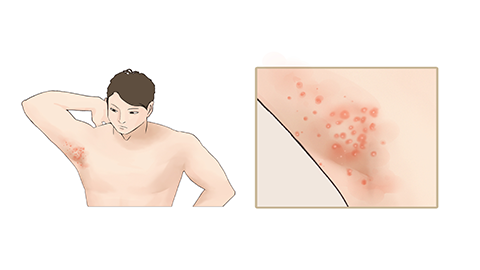How Does Body Odor (Bromhidrosis) Develop?
Body odor may be caused by genetic factors, puberty development, underarm bacterial infection, endocrine disorders, diabetes, and other factors. If abnormalities occur, timely medical attention is recommended. Detailed analysis is as follows:

1. Genetic factors: If there is a family tendency for body odor, genetic factors may influence the structure and function of apocrine glands, leading to higher levels of organic substances in the sweat secreted by the apocrine glands. These substances produce odor after being decomposed by bacteria, forming body odor. It is important to maintain daily hygiene by showering regularly, changing clothes frequently, and keeping the underarm area dry and clean.
2. Puberty development: Hormonal changes during puberty, particularly increased secretion of androgens, stimulate the rapid development and enhanced secretion function of underarm apocrine glands. The increased amount and altered composition of sweat can lead to body odor when decomposed by bacteria. It is recommended to wear loose, breathable cotton clothing to avoid sweat accumulation in the underarm area, and to use mild cleansing products for underarm hygiene.
3. Underarm bacterial infection: Excessive bacterial growth on the underarm skin can decompose sweat secreted by the apocrine glands, producing volatile unsaturated fatty acids and other substances that cause odor, leading to body odor. This is often accompanied by symptoms such as redness and itching of the underarm skin. Doctors may recommend using mupirocin ointment, clindamycin gel, or compound Phellodendron liquid preparations to inhibit bacterial growth.
4. Endocrine disorders: Long-term irregular lifestyle and high mental stress can lead to endocrine system imbalance and abnormal hormonal fluctuations, affecting the secretory function of apocrine glands and causing abnormal sweat secretion, which can result in body odor after bacterial decomposition. This may be accompanied by symptoms such as menstrual irregularities and worsening skin condition. Doctors generally recommend using medications such as oryzanol tablets, vitamin B6 tablets, and Xiaoyao pills to regulate endocrine function and alleviate body odor.
5. Diabetes: Poor blood sugar control in diabetic patients leads to metabolic disturbances, with some metabolic byproducts excreted through sweat. Additionally, the high blood sugar environment promotes bacterial growth, resulting in body odor. Symptoms may include increased thirst, frequent urination, and weight loss. Diabetes treatment may involve following medical advice to use medications such as metformin hydrochloride tablets, gliclazide sustained-release tablets, and repaglinide tablets to manage the condition.
In daily life, maintaining a regular routine, avoiding staying up late, eating a light diet, and reducing the intake of spicy and irritating foods are recommended.




